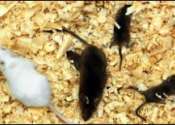Research wrests partial control of a memory
Scripps Research Institute scientists and their colleagues have successfully harnessed neurons in mouse brains, allowing them to at least partially control a specific memory. Though just an initial step, the researchers hope ...
Mar 22, 2012
3
0



